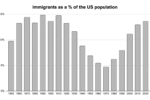
(Outlet: MSNBC) In 1924, President Calvin Coolidge signed the National Origins Act – a restrictive immigration bill that had lasting negative economic and social consequences. 100 years later, we find ourselves having a similar rhetorical and ideological debate about immigration. Donald Trump and his allies are stoking anti-immigrant sentiment and pushing the idea that immigration is the reason the United States is a “nation in decline”. Wharton School Professor and author Zeke Emanuel Hernandez points out to Ali Velshi that it’s in America’s best interest, socially and economically, to embrace immigrants. …Read More











